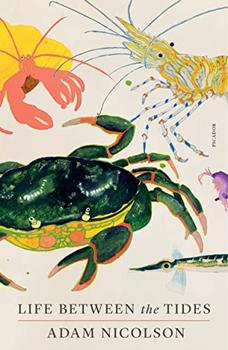Summary | Excerpt | Reviews | Beyond the Book | Readalikes | Genres & Themes | Author Bio

INTRODUCTION
The marvellous
The sea is not made of water. Creatures are its genes. Look down as you crouch over the shallows and you will find a periwinkle or a prawn, a claw-displaying crab or a cluster of anemones ready to meet you. No need for binoculars or special stalking skills: go to the rocks and the living will say hello.
In the 1850s, when Victorian Britain fell in love with the seaside, the rock pool became the heart of a kind of natureworship which saw in its riches and calm a reassuring vision of creation. Life in what Philip Henry Gosse, the great apostle of the pools, called 'these unruffled wells' was a gathering of goodness and even happiness. It was as if the pools came from a time before the Fall, when life was innocent and unthreatened. Gosse, surely half-remembering the children's rhyme, imagined 'Adam and Eve, stepping lightly down to bathe in the rainbow-coloured spray.' At just the moment Darwin was challenging the God-ordained vision of nature, and setting the whole of life adrift on chance-driven change, the rock pools looked to those Victorians like gardens of prelapsarian bliss, glimmering enclosures in which nature seemed to have enshrined perfection and permanence.
We have inherited some of that Victorian longing for calm. We still go to the seaside for consolation and simplicity. Demands and anxieties seem to drop away there; things still are as they were when we were ten. The rock pools still beckon, the blennies and gobies still shimmer beneath us. But there are ironies in choosing the shore as a theatre for reassurance. Even if its changes are dependable and rhythmic, it is thick with variability. A tidal coast is filled with that paradoxical quality: reliable unreliability, both closed and open-ended, both familiar and strange. Regularity toys with uncertainty there. Nothing is more predictable than the coming and going of the tide and yet nothing about it can be relied on: daily revelation and daily erasure, daily loss and daily reacquisition.
This book is about those multiple layers between the tides, the ways in which the simple overlies the less-than-simple there, the extraordinary mirroring of human and animal life on its shores, in pools that are silent and beautiful and as full of threat as any rats' alley or Roman circus. The intertidal is rich but troubled; as no coincidence, it is one of the most revelatory habitats on earth. Of all the great discoveries made in the science of nature, from a grasp of taxonomy, to the sequence of creatures through time revealed in the rocks, the adaptations of organisms to circumstance, the idea of natural selection – finally crystallising in Darwin's mind as he spent eight long years examining the inner structures of the barnacle – the working of ecological webs and the governing importance of trophic cascades – all these ways of understanding the pattern of life first emerged from studying what was happening to animals and plants between the tides.
It is where you can look beyond your own reflection and find the marvellous an inch beneath your nose. 'The soul wants to be wet,' Heraclitus said in Ephesus 2,500 years ago. That is the impulse this book follows.
It began for me in springtime, thirty years ago. I had not long known Sarah, who was soon to be my wife, when she took me to a place she had known since she was a girl. Her family had been coming there for years, far out on the west coast of Scotland, in Argyll where David Balfour in Kidnapped had found the sea 'running deep into the mountains and winding about their roots', an intercut geography 'as serrated as a comb'. Even on the map, land and sea there is as interlaced as the fingers of two hands.
We stayed the night about ten miles away in a small guest house on the shores of Loch Sunart. A polite atmosphere: cloths on the tables, charming, smiling service at dinner by the man who owned the hotel, a retired biologist, who dipped the end of his tie in the parsnip soup as he set it down in front of us. No one in the dining room said a word. The butter came on silver scallops, the oatcakes were in their own airtight tin and we whispered our secrecies over the venison and the crumble.
Excerpted from Life Between the Tides by Adam Nicolson. Published by Farrar, Straus and Giroux. Copyright © 2021 by Adam Nicolson. All rights reserved.




The truth does not change according to our ability to stomach it
Click Here to find out who said this, as well as discovering other famous literary quotes!
Your guide toexceptional books
BookBrowse seeks out and recommends the best in contemporary fiction and nonfiction—books that not only engage and entertain but also deepen our understanding of ourselves and the world around us.